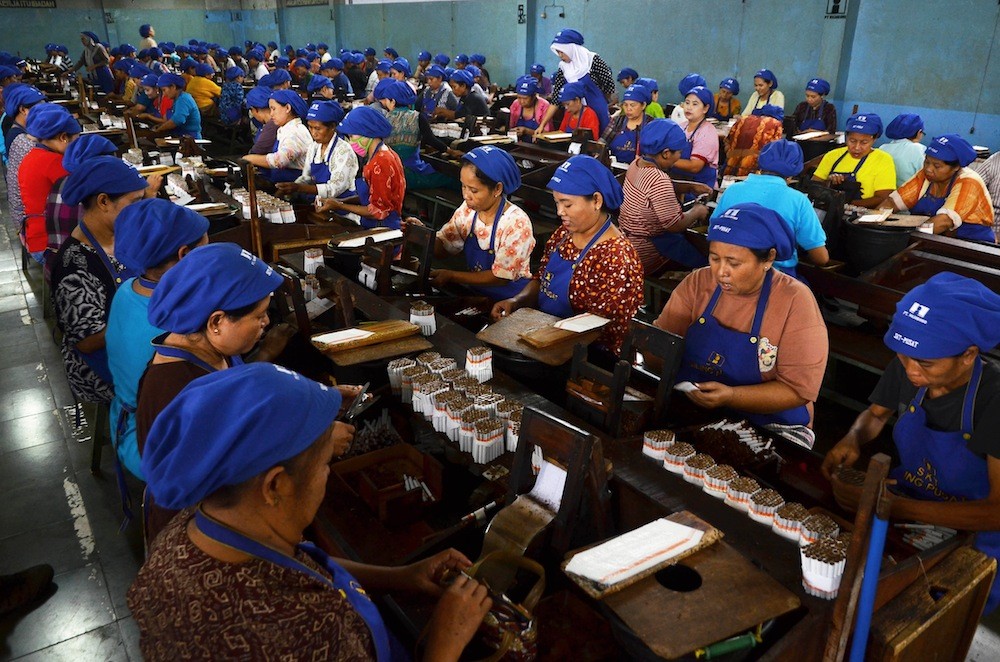Popular Reads
Top Results
Can't find what you're looking for?
View all search resultsPopular Reads
Top Results
Can't find what you're looking for?
View all search resultsJokowi encouraged not to change stance on tobacco bill
The recent decision made by President Joko “Jokowi” Widodo to kill the controversial tobacco bill and support public health has garnered compliments from the public and anti tobacco activists. However, his decision to send ministers to inform the House is feared to open gates that could overturn his decision.
Change text size
Gift Premium Articles
to Anyone
The recent decision made by President Joko “Jokowi” Widodo to kill the controversial tobacco bill and support public health has garnered compliments from the public and anti tobacco activists. However, his decision to send ministers to inform the House is feared to open gates that could overturn his decision.
Jokowi had decided not to issue a presidential letter to show his standpoint on rejecting the bill to the House of Representatives before the March 19 deadline. In order to convey his decision, he assigned Trade Minister Enggartiasto Lukita and State Secretary Pratikno to meet the lawmakers over the bill.
The reason why he ordered a Trade minister to got to the House remains unclear. Enggar is a veteran property businessman and a politician from NasDem, a party which is among those that initiated the bill.
It was an unusual move for the government to send representatives to the House after making a decision instead of prior to it for discussion purposes, National Commission on Tobacco Control (Komnas PT) member Widyastuti Soerojo said on Friday.
The State Secretary Office should simply send a letter to inform the House about the government’s rejection without sending ministers as messengers. The presence of ministers in delivering the message could be used by lawmakers to lobby for bill deliberations, she said on the rampant illicit practices and lobbies often exercised in bill deliberations.
“Why wouldn’t [the President] issue a letter after making a decision, the government still sends ministers to the House? This will open channels for lobbying that could change the government’s standpoint,” Widyastuti said.
She urged the government not to change its mind for the sake of protecting the people from the danger of tobacco.
Widyastuti added that Jokowi’s decision supported the nine priorities in his Nawacita agenda, which aims at improving the quality of human resources and improving productivity.
Similarly, Tulus Abadi, from the Indonesian Consumers Foundation (YLKI), said that President Jokowi has made the right decision by not approving the deliberation of the bill as it complied with demands from the public.
“Jokowi must firmly announce that the deliberation will not take place as long as he is in office,” he said.
The bill, which seeks to triple cigarette production to 524 billion by 2020, infringes on the government’s 2015-2019 medium term development plan (RPJMN) to cut the country’s smoking prevalence for smokers under 18 from 7.2 in 2013 to 5.3 in 2019.
Learning of the rejection, the House Legislation Body (Baleg) deputy speaker Firman Subagyo of Golkar rebuked the government and threatened to refuse bills initiated by the government in the future.
The 2017 National Legislation Program (Prolegnas) includes 51 bills initiated by the government of the total 182 bills to be discussed by 2020.
The list includes some bills that are currently being discussed by the House, such as a bill on counterterrorism, which aims to comprehensively improve Law No. 15/2003 on the prevention of terrorism, a bill on tax amnesty and an amendment bill to the Criminal Code (KUHP).
While the government spends more money on tobacco related illnesses every year, the tobacco industry players in Indonesia get richer by pocketing trillions from the tobacco industry.
The Health Ministry has long campaigned for tighter tobacco control, which is crucial to saving about 200,000 Indonesians who die every year due to tobacco-related illnesses and to save Rp 378 trillion (US$28 billion) in economic losses caused by smoking.










